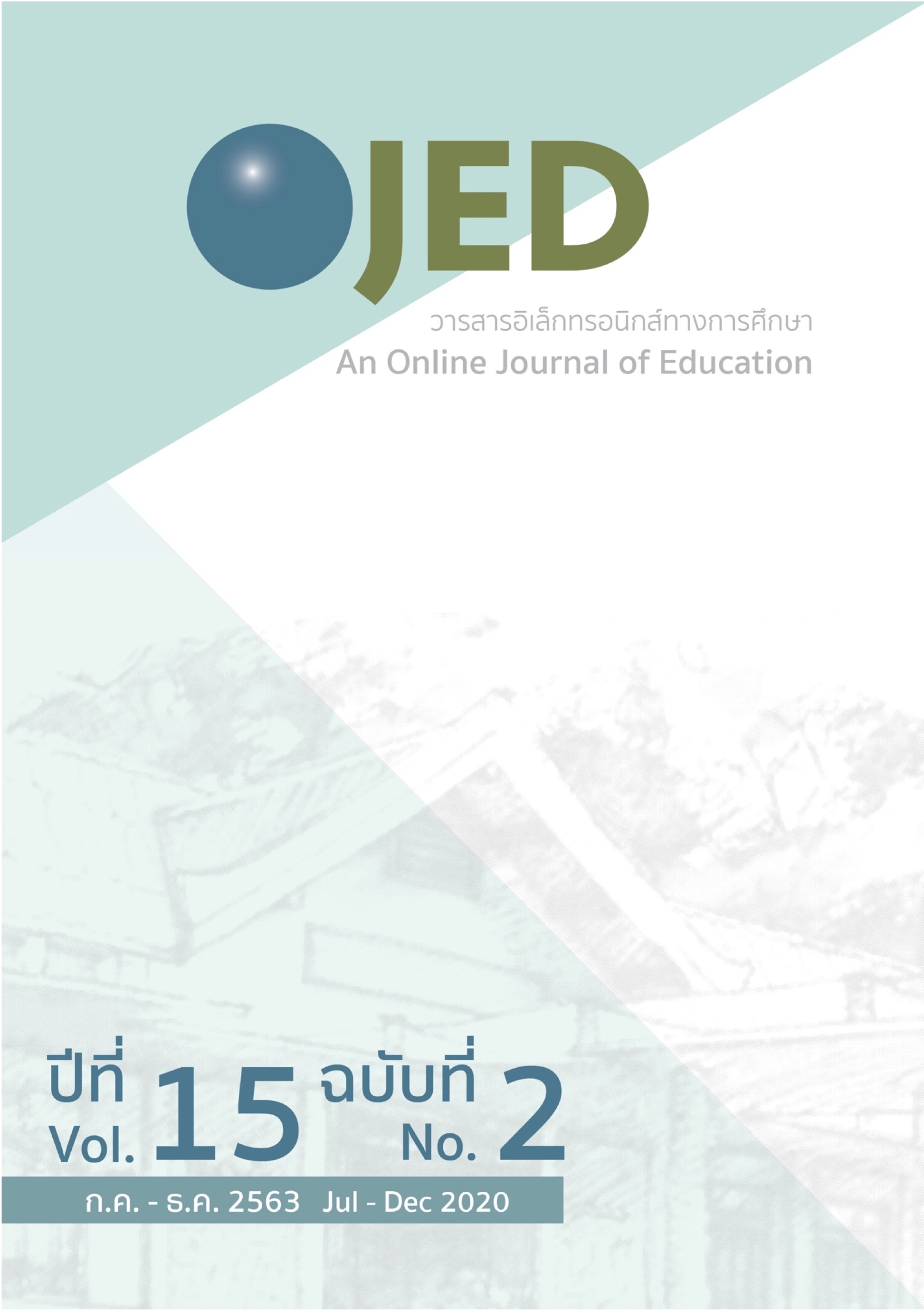Instructional Guidelines to Enhance Students’ Entrepreneurship: Crowdsourcing
DOI:
https://doi.org/10.14456/ojed.2020.30Keywords:
Entrepreneurship, Entrepreneurial Orientation, Entrepreneurship Education, CrowdsourcingAbstract
This study analyzed and synthesized data on students’ entrepreneurship enhancement, resulted in a new set of instructional guidelines to effectively enhance students’ entrepreneurship.
The data, collected in interviews with experienced entrepreneurship instructors and crowdsourced from netizens, were analyzed using content analysis.
The results revealed five key instructional guidelines to enhance students’ entrepreneurship.
The first is to integrate business knowledge into the curriculum by preparing fundamentals about founding and managing businesses. The second guideline is to prepare students through exposure to practical activities. They should be able to practice writing business plans, executing projects, or creating small businesses on their own. Thirdly, activities are important for students to express their interests. At the same time, instructors should help pupils analyze and plan their development and career path. The fourth guideline is to establish a good attitude towards being an entrepreneur. Lastly, business case simulation and case studies should be incorporated into classes as teaching materials.
References
กระทรวงศึกษาธิการ. (2561). รายการวิจัย การจัดการศึกษาเพื่อพัฒนาความเป็นผู้ประกอบการ (Entrepreneurship Education). พริกหวานกราฟฟิค.
Bellance, J., & Brandt, R. (2011). 21st Century skill: Rethinking how students learn. Solution Tree Press.
Blawatt, K. R. (1998). Entrepreneruship process and management. Upper Patrick Ferrier.
Brabham, D. C. (2013). Crowdsourcing. The MIT Press.
De Lourdes Cárcamo-Solís, M., del Pilar Arroyo-López, M., del Carmen Alvarez-Castañón, L., & García-López, E. (2017). Developing entrepreneurship in primary schools: The Mexican experience of my first enterprise: entrepreneurship by playing. Teaching and Teacher Education, 64, 291-304. https://doi.org/10.1016/j.tate.2017.02.013
Farashahi, M., & Tajeddin, M. (2018). Effectiveness of teaching methods in business education: A comparison study on the learning outcomes of lectures, case studies and simulations. The International Journal of Management Education, 16, 131-142. https://doi.org/10.1016/j.ijme.2018.01.003
Hargrave, M. (2019, July 8). Crowdsourcing. Investopedia. https://www.investopedia.com/terms/c/crowdsourcing.asp
Howe, J. (2006, June). The rise of crowdsourcing. Wired Magazine, 14(6). https://www.wired.com/2006/06/crowds/
Lackeus, M. (2015). Entrepreneurship in education what, why, when, how. OECD.
Lee, K. (2018). What do we think how best to teach university students to become entrepreneurial: The lecturers’ perspective. Proceedings of the 6th International Conference on Innovation and Entrepreneurship, USA, 206-213.
Lumpkin, G. T., & Dess, G. G. (1996). Clarifying the entrepreneurial orientation construct and linking it to performance. Academy of Management Review, 21(1), 135-172.
Michael, S. C. (2018). What should we teach in the new ventures class? An empirical analysis. Journal of Entrepreneurship Education, 21(2), 1-17.
Miller, D. (1983). The correlates of entrepreneurship in three types of firms. Management Science, 29(7), 770-791.
Miller, D., & Friesen, P. H. (1982). Innovation in conservative and entrepreneurial firms: Two models of strategic momentum. Strategic Management Journal, 3(1), 1-25.
Mintzberg, H. (1973). Strategy-making in three modes. Califonia Management Review, 16(2), 44-53. https://doi.org/10.2307%2F41164491
Morris, M. H. (2017). Why content and lecture matter in entrepreneurship education. In D. F. Kuratko & S. Hoskinson (Eds.). The great debates in entrepreneurship (pp. 1-8). Emerald Publishing Limited. https://doi.org/10.1108/S1048-473620170000027002
Nabi, N., Walmsley, A., Liñán, F., Akhta, I., & Neame, C. (2018) Does entrepreneurship education in the first year of higher education develop entrepreneurial intentions? The role of learning and inspiration. Studies in Higher Education, 43(3), 452-467. https://doi.org/10.1080/03075079.2016.1177716
Olokundun, M., Moses, C. L., Iyiola, O., Ibidunni, S., Ogbari, M., Peter, F., & Borishade, T. (2018). The effect of non-traditional teaching methods in entrepreneurship education on students’ entrepreneurial interest and business startup: A data article. Data in Brief, 19, 16-20. https://doi.org/10.1016/j.dib.2018.04.142
Swanson, L. A. (2017). Entrepreneurship and Innovation Toolkit. Pressbook.
https://openpress.usask.ca/entrepreneurshipandinnovationtoolkit/
Willians, J. L., & Gentry, R. J. (2017). Keeping it real: The benefits of experiential teaching methods in meeting the objectives of entrepreneurship education. In D. F. Kuratko & S. Hoskinson (Eds.). The great debates in entrepreneurship (pp. 1-8). Emerald Publishing Limited. https://doi.org/10.1108/S1048-473620170000027003
Wilson, K. E., Vyakarnam, S., Volkmann, C., Mariotti, S., & Rabuzzi, D. (2009, April). Educating the next wave of entrepreneurs: Unlocking entrepreneurial capabilities to meet the global challenges of the 21st century. In World Economic Forum: A Report of the Global Education Initiative.
World Economic Forum. (2011). Unlocking entrepreneurial capabilities to meet the global challenges of the 21st century: Final report on the entrepreneurship education workstream. In World Economic Forum Global Education Initiative. World Economic Forum.
Yuen, M. C., King, I., & Leung, K. S. (2011, October). A survey of crowdsourcing systems. In 2011 IEEE Third International Conference on Privacy, Security, Risk and Trust and 2011 IEEE Third International Conference on Social Computing (pp. 766-773). IEEE.
Zulfiqar, S., Sarwar, B., Aziz, S., Chandia, K. E., & Khan, M. K. (2019). An analysis of influence of business simulation game on business school students’ attitude and intention toward entrepreneurial activities. Journal of Educational Computing Research, 57(1), 106-130. https://doi.org/10.1177/
Downloads
Published
How to Cite
Issue
Section
License
Copyright (c) 2020 An Online Journal of Education

This work is licensed under a Creative Commons Attribution-NonCommercial-NoDerivatives 4.0 International License.




